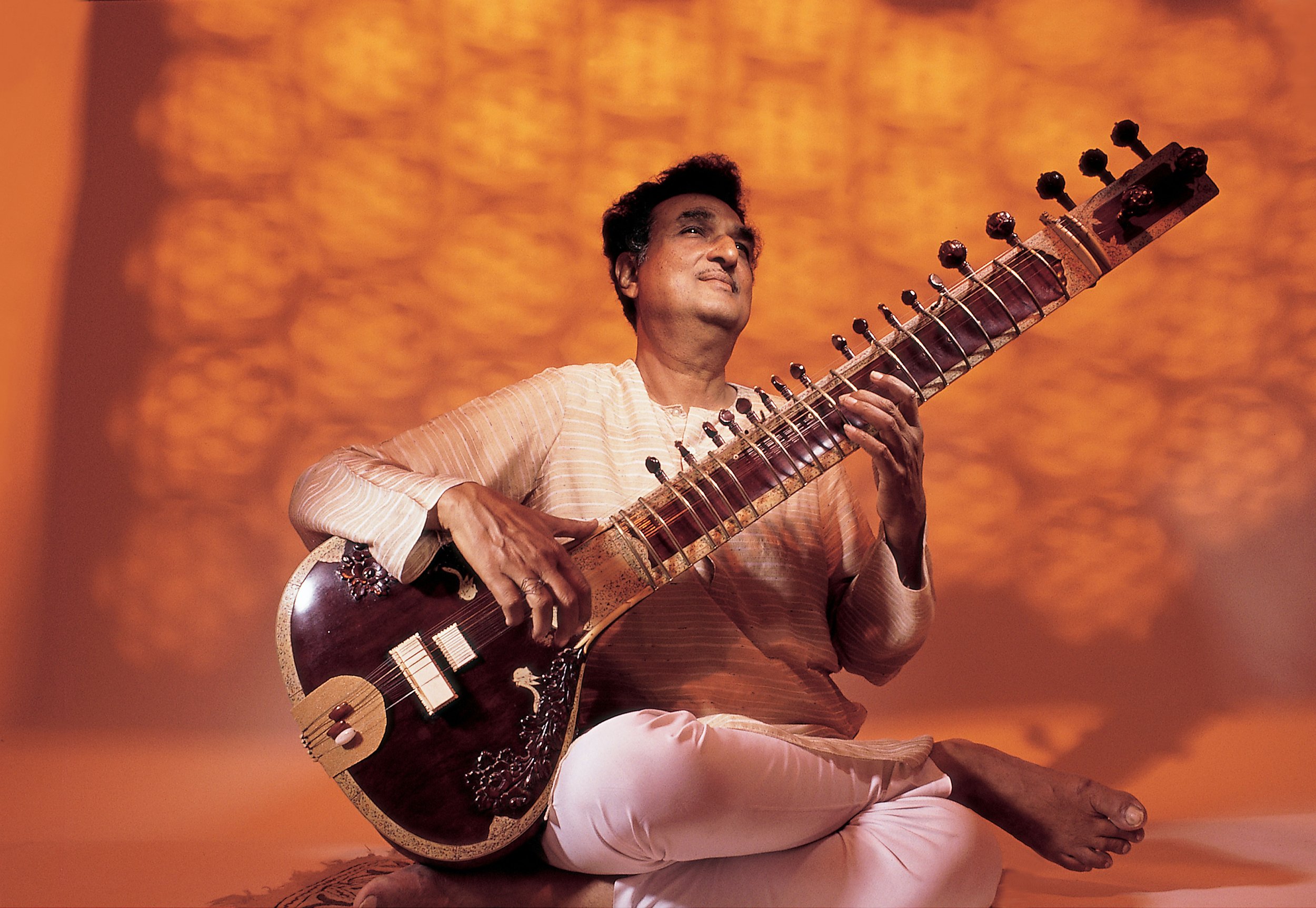
Padmabhushan Ustad Abdul Halim Jaffer Khan
"Future historians of Indian classical music will note Khan saheb's seminal contribution to our musical heritage in golden letters. His performances have been characterized by his mastery of the instrument, the musical idiom, artistry, innovations and virtuosity." –Annapurna DeviAbdul Halim Jaffer Khan
“The legendary Ustad Halim Jaffer Khan saheb is instrumental in giving a new dimension to the art of sitar playing…his own style, “Jafferkhani Ang” is now a permanent contribution for which he will always be remembered.” –Ustad Amjad Ali Khan
Daring innovator and pioneer of the Jafferkhani Baaj in sitar, Padmabhushan Ustad Abdul Halim Jaffer Khan was an indelible part of India's sitar trinity with Ustad Vilayat Khan and Pt. Ravi Shankar. He hails from the Bande Ali Khan - Indore Beenkar Gharana, and received tutelage from his father Jaffer Khan, a well known singer, sitarist and beenkar. The Ustad was a distinguished All India Radio Artist since the early 1940's credited with bringing Carnatic ragas such as Kirwani, Kanakangi, Latangi, Karaharapriya, Manavati, Ganamurti and others into the sitar repertoire, rendering them through a classical Hindustani sensibility and his distinct Jafferkhani Ang.
Always seeking to break new ground, the maestro’s early experimentation with polyphony in Indian classical instrumentation was achieved in his own sitar quintet. Ustad Abdul Halim Jaffer Khan was the first classical Hindustani musician also to collaborate within the Carnatic tradition in a performance with Veena maestro Dr. Emani Sankara Sastri. In 1958, he collaborated with the iconic American Jazz pianist and composer Dave Brubeck, for a rare performance with the Dave Brubeck Quintet which was part of Brubeck's Jazz Ambassador residency in India, sponsored by the U.S. State Department. That memorable encounter with the Sitar maestro, Brubeck stated in an interview in Jazz Journal International, made him "play jazz in a different way". The Ustad collaborated with noted English guitarist Julian Bream in 1963. In a memorable trio concert in China, Khansaheb performed with Sarangi maestro Pandit Ram Narayan, and the Sarod Maestro and the Mohan Veena innovator, Pandit Radhika Mohan Maitra. In the 1959 film, Goonj Uthi Shehnai, the Ustad performs a never before heard sitar jugalbandi with shehnai maestro and Bharat Ratna, Ustad Bismillah Khan.
Ustad Abdul Halim Jaffer Khan has bequeathed an invaluable musical legacy to the history of Indian cinema. The renowned composer and All India Radio (AIR) broadcaster, Khwaja Khurshid Anwar invited Khansaheb, a teen prodigy then, to record for what would be K.L Saigal’s final film, Parwana (1947). Khansaheb composed and played for epic films as Anarkali, Mughal-e-Azam, Jhanak Jhanak Payal Baaje, Kohinoor, Do Aankhe Bara Haath, Annapoorna, Yaadein, Sampoorna Ramayana, Baradari, and Shabab, to name a few. He collaborated with renowned music directors as Naushad, Anil Biswas, Vasant Desai, D. P. Korgaonkar, Shri. Ramachandra and Madan Mohan. Khansaheb’s iconic sitar-shehnai jugalbandi with Padmabhushan Ustad Bismillah Khan is memorialized in the film Goonj Uthi Shehnai.
Photo: Pre-eminent film composer Naushad Ali with Ustad Abdul Halim Jaffer Khan
“Not only did Abdul Halim Jaffer Khan enrich the music of Indian cinema, his contribution lent prestige to my music.” –Naushad Ali
A member of the Indian cultural delegation to China in 1955, Khansaheb gave over 50 concerts in the Republic of China. In 1964, he performed in Afghanistan, and in 1972, he performed at the State Goodwill visit of the President of India to Kabul. In 1972 also, he toured Hungary, Romania and Czechoslovakia. From 1958 to 1977, he routinely taught and performed in Nepal, Mauritius, Sri Lanka and East Africa. In 1983, the Ustad toured and performed in the United States of America and Canada, where at various universities he gave lecture demonstrations and taught seminars on shastriya sangeet.
Khansaheb was Visiting Professor and Examiner at the Maharaja Sayajirao University in Baroda, Indira Kala Sangeet Vishwavidyalaya in Khairagarh, and Department of Music and Fine Arts at Delhi University. He served on the Advisory Committee of the Government College of Dance and Music (Hyderabad), Central Board of Film Certification (Bombay), Music Audition Board of All India Radio (AIR), National Committee of Hazrat Amir Khusrau Dehlvi, Centenary Celebration (New Delhi), Expert Selection Committee at M.S. University (Baroda) and LKSV Indira Kala Sangeet Vishwavidyalaya (Chattisgargh), and as Vice Chairman of the India Musicological Society (Baroda).
Ustad Abdul Halim Jaffer Khan was awarded the Padmabhushan in 2006, Gwalior Tansen Samman in 2000, Tagore Ratna in 2012, Gaurav Puraskar by Government of Maharashtra in 1990, Shikhar Samman by Government of Madhya Pradesh in 1991, Sangeet Natak Akademi Puraskar in 1987 and the Padmashri in 1970. He is a recipient of a Silver Medal by the Mayor of Bombay (1985), Ustad Allauddin Sangeet Ratna (1986), Haafiz Ali Khan Award (1994), Srestha Kala Acharya (1998), Nada Nidhi Avadhoota Datta Peetham (1998), Sangeet Research Academy ITC-SRA Award (2000), Acharya Pt. Ramnarain Foundation Award (2002), Legends of India Lifetime Achievement Award (2005), among numerous other accolades.
In 1976, Ustad Abdul Halim Jaffer Khan established Halim Academy of Sitar, the very first institute of its kind in the nation. Today, noted sitarist and composer, the Ustad’s son Zunain Khan teaches sitar to students from all over the world.
The maestro released Jafferkhani Baaj: Innovation in Sitar Music, as an introduction to his perspective on music, innovations and unique style of the Jafferkhani Baaj.


